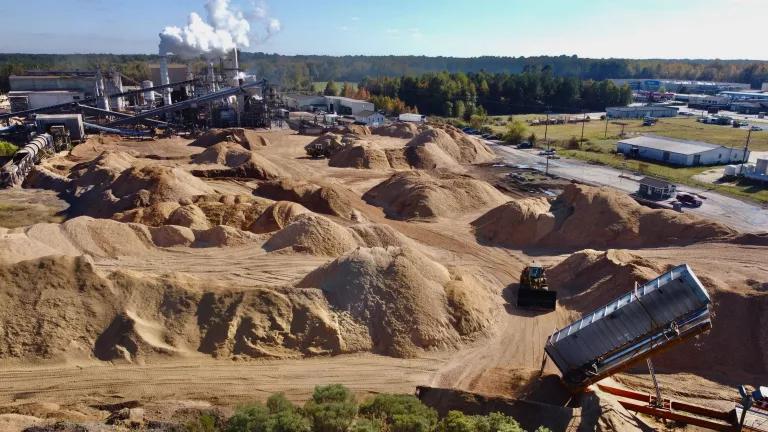Governor Newsom Looking toward Recovery, Guided by Science
The fight against the climate crisis continues and California legislators are approaching the battle in new ways, with new coalitions. Here are some key environmental bills to watch.

A firefighter extinguishes hotspots while battling the Olinda Fire in Anderson, Calif., Sunday, Oct. 25, 2020. The blaze was one of four fires burning near Redding that firefighters scrambled to stop as high winds buffeted Northern California.
California Legislative Session in Full Swing
The central themes of Governor Newsom’s recent state of the state speech were California’s values of equity, economic justice, and following science in combatting the dual crises of COVID-19 and climate change. Thankfully, 2021 brings us new hope because not only does the governor trust science and strive to correct historical injustices, but we again have a president in the White House who is guided by these same principles.
Under the lights of Dodger Stadium, one of the state’s COVID-19 mass vaccination sites, the governor expressed condolences for the more than 55,000 Californians lost to COVID, and optimism for the future with vaccines, school re-openings and an ability to invest the state’s surplus in infrastructure, education and economic support for those who have struggled the most. While we still have challenges ahead, people are being vaccinated at a steady clip, businesses are reopening, and our youngest students have begun returning to in-person school.

California Gov. Gavin Newsom delivers his State of the State address from Dodger Stadium as his wife Jennifer Siebel Newsom listens Tuesday, March 9, 2021, in Los Angeles.
The governor also dedicated a section of his speech to the climate crisis. He recommitted to wildfire prevention and cutting greenhouse gas emissions from transportation. With the California legislative session underway, NRDC and our partners are working to deliver new and ambitious climate-related policies to Governor Newsom’s desk later this year. We must keep pushing bold strategies to achieve a clean energy future, abundant biodiversity, healthy communities, economic justice, and clean air and water for all. We have powerful allies, but we also have well-resourced opponents who are prepared to mislead the public to protect entrenched special interests.
The fight against the climate crisis continues and California legislators are approaching the battle in new ways, with new coalitions. Here are some key environmental bills to watch at this point in the legislative session.
Curbing Climate Emissions and Improving Community Resilience
AB 117 (Boerner Horvath) – Provides incentives for e-bike purchases
AB 1087 (Chiu) – Environmental Justice Community Resilience Hubs Program*
AB 1365 (Bonta) – Incorporates concrete into the Buy Clean California Act*
AB 1395 (Muratsuchi and C. Garcia) – Codifies California’s goal to reach carbon neutrality by 2045
AB 1401 (Friedman) – Eliminates the requirement for excess parking spaces near transit
SB 1 (Atkins) – Improves state planning for sea level rise
SB 30 (Cortese) – All-electric new construction of state buildings
SB 260 (Wiener) Climate Corporate Accountability Act
SB 261 (Allen) – Updates regional land use plans to better align with state greenhouse gas reduction goals
SB 345 (Becker) – Help ensure that all of the benefits of energy efficiency are incorporated into program cost-effectiveness assessments
SB 449 (Stern) – Requires disclosure of climate-related financial risk for specified businesses*
SB 467 (Wiener and Limón) – Phases out fracking and other oil extraction practices. Requires a buffer zone of 2500 feet between oil drilling and homes, schools, day cares and other sensitive sites.
SB 542 (Limón) – Zero Emission Truck Tax Parity
SB 596 (Becker) – Requires a statewide strategy to reduce emissions from the cement and concrete sector*
Pandemic Recovery and Economic Justice
AB 84 (Ting) and SB 95 (Skinner) – Extends supplemental paid sick leave for certain essential workers
SB 222 and SB 223 (Dodd) – Protects Californians from water shutoffs and provides low-income rate assistance
Protecting Communities from Toxic Pollution
AB 1 (C. Garcia and Santiago) – Reforms the state Department of Toxic Substances Control to better protect communities from industrial pollution
AB 1200 (Ting) – Bans PFAS forever chemicals in paper-based food packaging*
AB 1182 (Stone) – Protects consumers by holding online marketplaces liable for defective products
SB 502 (Allen) – Addresses impediments to the state’s “green chemistry program” that have hindered its ability to reduce the hazards of toxic chemicals in consumer products*
Protecting Natural Resources
AB 125 (R. Rivas) – Food and farming systems, COVID recovery bond
AB 377 (R. Rivas) – California Clean Water Act
AB 416 (Kalra) – Deforestation-Free Procurement Act
AB 1500 (E. Garcia and Mullin) – Safe Drinking Water, Wildfire Prevention, Drought Preparation and Workforce Development Bond Act of 2022
SB 45 (Portantino, Stern, Allen, Hurtado) – Wildfire Prevention, Safe Drinking Water, Drought Preparation, and Flood Protection Bond Act of 2022
SB 266 (Newman) – Expand Chino Hills State Park
Reducing Plastic Pollution
SB 54 (Allen, Stern and Wiener) – Plastic Pollution Producer Responsibility Act
AB 962 (Kamlager) – Allows refillable bottles to be preserved for reuse rather than being crushed for recycling
AB 1276 (Carrillo) – Reduces unnecessary food service ware

California is the first state in the nation to pledge to conserve 30% of its land and coastal water by 2030, joining 38 countries in a commitment to conservation.
Alexander Bennett / EyeEm via Getty Images
NRDC is also working on several state budget issues, including:
- Farm to School program funding,
- Incentives for building and transportation electrification,
- Wildfire prevention,
- Lands and wildlife protection,
- Update fees to better reflect the risks and burdens posed by the most toxic pesticides
Budget and bill hearings are underway with opportunities for remote public participation. Bills must pass their first policy committees by the end of April, with few exceptions. Some of the bills listed above may be held as “two-year bills” to be revisited again in 2022. Also, new bills could emerge in the next few months. NRDC’s advocacy team is continually monitoring the legislature and communicating with allies to ensure that we’re engaged on the most important legislation moving forward at any given time. We’ll update our list of key bills to watch as the session unfolds.
California has the will, innovative spirit, and the expertise to enact policies that clean the air, combat climate change, improve worker rights, ensure access to clean water, and protect our communities from pollution and toxic chemicals. We need all Californians to join with us in the fights that lie ahead.
*NRDC is a co-sponsor or sponsor of the legislation.


